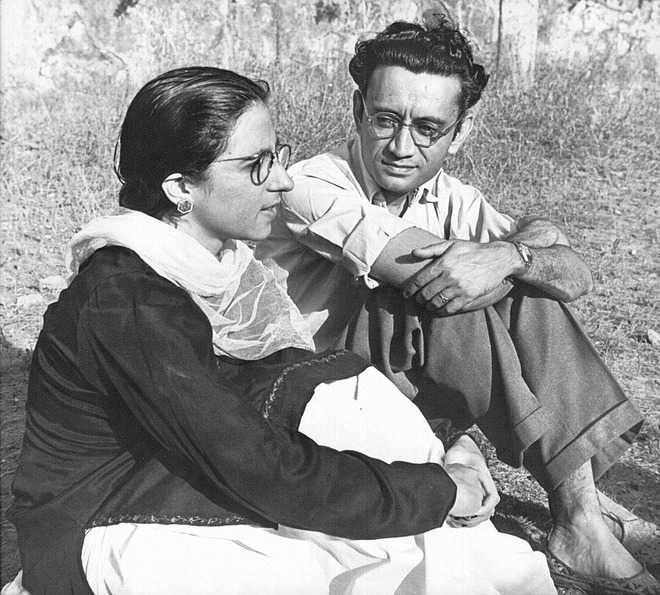
Manto with his wife Safia
Faiqa Mansab
Writing about wives of famous authors is always tricky. While their contribution to the writers’ lives and their writings remains beyond doubt, what remains unacknowledged is the struggle which a writer often has to face before achieving success and the resultant harsh realities that are even harder for his wife. The partners/spouses of famous writers such as Ernest Hemingway, Vladimir Nabokov, Leo Tolstoy, F. Scott Fitzgerald, and very own Saadat Hasan Manto, have been written about many times.
Accounts about Manto’s wife Safia describe her as woman of quiet strength. No doubt, Manto was a brilliant writer but he was also a maverick who defied norms and challenged social morality. His propensity for truth often landed him in trouble with peers and publishers alike. While his writings were a mirror of the turbulent reality of the times, particularly Partition, his stories portraying the struggles of the common people were often dubbed ‘obscene’ resulting in court cases.
As a result, money was always short. Manto took to drinking. Despite that he wrote with more clarity than ever. From pinnacle of success to fall from grace, Safia remained in his shadow, though he did write a short story, Hameed aur Hameeda, on her but that’s what writers do.
Being a writer’s wife isn’t glamorous. The reality is always something else. Vera Nabokov was her husband’s editor.
Zelda Fitzgerald had accused her husband of stealing ideas from her diary. Safia is said to have been Manto’s sounding board for his writings. Manto’s writings often reflected his personal tragedies. His anguish at the death of his firstborn, Arif, in the early 1940s, resulted in a short story, Khaled Mian, which was about a son’s early demise and the impact it had on his father. But here again Manto only writes about a father’s grief. Didn’t Safia, too, lose a son?
They had three daughters whom Safia raised on her own after Manto died when the eldest was only seven. But only his fatherly affection is documented in many accounts — how he used to play with them or how he used to wait with pomegranate seeds on their return from school. Yet Safia remains only a footnote, an accessory, a point of interest in Manto’s biopic. She remains only his wife, never taking into account her struggles, which his early death because of his alcoholism, must have brought about. Despite all roles Safia had as a daughter, a sister, a mother, a grandmother, she would be remembered only as Manto’s wife.
Silver screen’s Safia
Manto’s women characters are indelibly etched on our mindscapes. However, when it comes to his other half Safia we draw a blank. But as Rasika Dugal has stepped into her shoes in the movie Manto, she is hoping Safia will breathe as a real flesh and blood person.
Indeed, while reading up Manto, she was also peeved why hadn’t he written about her. “It’s only briefly that he talks about his wife in the Stars From Another Sky. One learns that Safia and her sister were star struck by Nargis and would often prank call her. Manto’s friend, writer Ismat Chugtai, has also spoken about Safia rather gently.” But the real information is only anecdotal, she says. Though director Nandita Das had done her homework and had gathered interesting nuggets from the couple’s daughters as well as Safia’s sister.
On her approach to Safia’s character, she didn’t want her to appear as a bechari. Says Rasika, “Often caregivers are misunderstood as weaklings and we miss the strength they possess. I wanted both her resilience and gentleness to show.” Rasika has also ensured that Safia doesn’t come across as an awestruck wife. “When you are husband and wife, however, famous your husband may be, you don’t wake up every morning wonderstruck, ‘oh my god’.”
Rasika also shares while Manto’s pen may have bled angst and pain, he was a loving husband and doting father. At one level she thinks the film is as much a story of a man and his family who were displaced from their roots.
The film also doesn’t corroborate what is commonly believed that it was Safia who cajoled Manto to leave Mumbai. Rasika says, “Why Manto, who believed mein chalta phirta Bombay hoon, migrated to Pakistan is not clear. But the pain of how he and Safia must have felt does pulsate in the film.” — NS



























